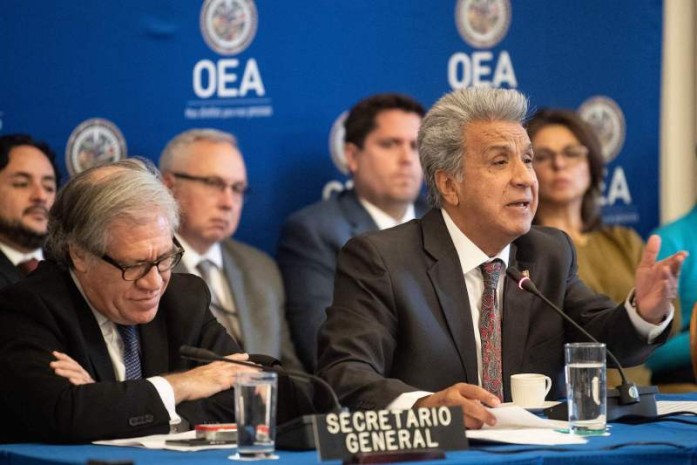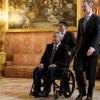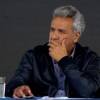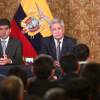Caso Chevron
For Ecuador’s Lenín Moreno, Evicting Julian Assange Is Only the Beginning
The Ecuadorian president is seeking to broadly reverse Rafael Correa’s legacy.
Foreign Policy 22/04/2019

Organization of American States Secretary-General Luis Almagro (left) listens while Ecuadorian President Lenín Moreno speaks at the OAS in Washington on April 17. Foto: Foreign Policy
After almost seven years of diplomatic protection, Julian Assange’s diminishing good will with Ecuador ran out. On April 11, Assange was expelled from the Ecuadorian Embassy in London, where he had been given asylum in 2012 by then-President Rafael Correa to avoid international criticism that his government was restricting freedom of expression. By protecting Assange, Correa also became an icon of the global political left.
Ecuador’s current president, Lenín Moreno—Correa’s former vice president, protégé, and hand-picked successor—not only expelled Assange from the embassy but also stripped him of the Ecuadorian citizenship granted by the government in 2017. Leftists around the world saw Moreno’s action as the culmination of his betrayal of Correa’s legacy.
First, he broke with Correa, and then he announced a popular referendum to be held in 2018, in which Ecuadorians voted overwhelmingly to reject the possibility of Correa’s re-election. (Although Correa, who is living in Belgium, is unlikely to return anytime soon—a judge has ordered his arrest in Ecuador based on his alleged participation in the failed kidnapping of an Ecuadorian opposition politician in Colombia.) Correa and his supporters argue that Moreno’s action shows the total reversal of his foreign policy. But Assange’s expulsion is only one example of how Moreno has largely reversed Correa’s plans for Ecuador since his election in 2017.
When Assange first sought refuge at the Ecuadorian Embassy, Correa had been in power for six years and was leading a charge to upend all of the country’s political institutions. A participatory constituent assembly drafted a new constitution that enhanced several rights—and even gave rights to nature—while concentrating power in the hands of the presidency. Correa put the state at the center of development. Ecuador, a member of OPEC, counts on oil as one of its largest sources of export revenue. By reaping the fruits of extraordinarily high oil prices, Correa had the resources to increase the size of the state, redistribute income, and reduce poverty. Yet in doing so he also increased the country’s economic dependency on the extraction of oil and minerals, and just in time for 2014’s steep drop in oil prices.
Even though some leftists around the world saw in Correa an anti-imperialist and progressive leader, a reputation that was bolstered when he gave Assange asylum, his relationship with the Ecuadorian left and social movements rapidly deteriorated.The main controversies hinged on issues of autonomy: The state took over institutions and development programs formerly managed by social movements, including programs that taught indigenous languages. Correa also clashed with indigenous groups over his policies for natural resource extraction. His administration criminalized protest and accused hundreds of indigenous and rural leaders of terrorism and sabotage. He repressed parties on the left and drastically increased oversight of nongovernmental organizations. He also took on privately owned media, using the legal system to target journalists, political cartoonists, and media owners.
In the context of acute confrontation with the media, the protection extended to Assange allowed Correa to perform a role, at least internationally, as a beacon of free expression. Correa invested resources to represent himself as a leftist leader to international audiences. For instance, his government invited international celebrities to participate in a campaign denouncing the environmental damages of Chevron-Texaco. He also hosted regional conferences for leftist intellectuals and politicians. By symbolically defying countries he condemned as imperialistic, it became less appealing for domestic and international leftists to question his autocratic policies at home.
Read more here
Fuente OriginalNotas relacionadas
-
 Assange y Correa, en la agenda de Lenín Moreno en su viaje a Europa
Assange y Correa, en la agenda de Lenín Moreno en su viaje a Europa -
 Moreno dice hay pruebas de que habitación de Assange fue centro de espionaje
Moreno dice hay pruebas de que habitación de Assange fue centro de espionaje -
 Assange intentó crear un 'centro de espionaje' en la embajada de Ecuador en Londres, según Moreno
Assange intentó crear un 'centro de espionaje' en la embajada de Ecuador en Londres, según Moreno -
 “Nos hemos librado de una piedra en el zapato”, dice Moreno
“Nos hemos librado de una piedra en el zapato”, dice Moreno -
 Ecuador retira asilo a Julian Assange
Ecuador retira asilo a Julian Assange -
 Ecuador no responderá a rumores sobre supuesto fin del asilo de Assange
Ecuador no responderá a rumores sobre supuesto fin del asilo de Assange
